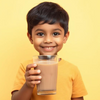
How do body image issues affect pre- teens?
Body image is how and what you think and feel about your body. A healthy body image means, when you feel comfortable with your physical appearance. But, unhealthy body image gives you a sense of discomfort with the way you look. People who feel this might have a strong desire to change their appearance.
Children's opinions of their bodies form at a very young age. Many factors influence the minds of these little ones. Hence parenting plays a very crucial role in helping a child develop a healthy body image and self-esteem.

Factors that result in body image issues
A child's mind and his/ her idea of body image can be influenced by many factors. For example:
The family environment
Peer pressure
Physical or mental abilities or disabilities
The attitudes of peers,unrealistic standards set up by social media
Puberty and hormonal changes also play a very important role in influencing their minds. During puberty, a child's body goes through a lot of changes which makes them conscious of their appearance. Hence, creating a strong desire to fit in with the rest.

Signs of Body image in pre-teenagers
It's very common for tweens and teenagers these days to feel insecure about their bodies. Being mindful of their habits and body language help analyse the cause of their stress and anxiety which leads to negative body image.
Here are a few signs to look out for:
Constantly criticising the way they look. for example, they might say they’re fat or ugly
Comparing themselves with others
Isolating themselves and not trying to get out of their comfort zone
Obsessing about their appearance, weight, or height
Unhealthy eating or sleeping habits
Linking food with feelings of guilt, shame, or blame.
Efforts to cover up insecurities
Long term effects to look out for
The effects of body image could be consuming and deep rooted. Here’s are few effects to watch out for:
Lack of self esteem and self confidence
Extreme social anxiety
Suffers through inferiority complex
Develops unhealthy relationship with food which could lead to eating disorders.

The Thing you can do for them
Choose your words wisely: "Words are sharper than swords”. Avoid using negative words and stimulate positive affirmation to boost their confidence
Focus on healthy habits: Eating healthy or exercising shouldn't feel like a punishment but rather be a fun activity for them. This could be done by doing more outdoor activities and consuming a well-balanced diet. Some research suggests that if the kids are involved in the cooking and shopping process, they are more likely to finish off and enjoy the meal.
Promote body positivity: It's crucial to talk to your kids about the realities of the world. Talking about gender and body stereotypes in the media can help them not fall prey to this scam. They should have an idea of what healthy bodies look like so that they don't set unrealistic expectations for themselves.
Be present: Appreciate your child. Tell them compliments that aren't appearance-centric. Have healthy communication where your child feels safe to open up. Not every day can be phenomenal, but trying will always make a difference.





 Shop All
Shop All
 Hazelnut Almond Spread
Hazelnut Almond Spread
 NutraMilk Mix
NutraMilk Mix
 Healthy Breakfast
Healthy Breakfast
 Combos
Combos
